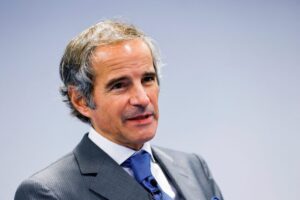The Director General of the International Atomic Energy Agency (AIEA), Rafael Mariano Grossi, said on Sunday (22) that US attacks against Iran’s nuclear facilities pose an immediate risk to the international regime for non-proliferation of nuclear weapons.
In a speech at the UN Security Council meeting, summoned after Saturday night bombing, Grossi said recent events expand the risk of safeguard collapse and unprecedented military climbing in the Middle East.
“We have a window of opportunity to return to dialogue and diplomacy. If this window closes, violence and destruction can reach unimaginable levels, and the global regime of non -proliferation, as we know it, can break and fall,” said Grossi. He recalled that the regime of non -proliferation has been supporting international security for over half a century.
Organize your financial life with AI
Grossi reported that he called an extraordinary meeting of the Council of Governors of AIEA for this Monday, 23, in Vienna, to discuss the impacts of the attacks and the next steps of the agency. “Any future agreement or arrangement will have as a prerequisite the establishment of facts on the ground. This can only be done through AIEA inspections,” he said.
The director general said the agency’s inspectors remain in Iran, but stressed the need for urgent access to the affected places. “We should return, as the UN Secretary-General has already said, in the negotiation window and allow the inspectors of the AIEA, the guardians of the non-proliferation treaty, access to nuclear places in Iran,” he said.
‘We need to take care of uranium materials’
Grossi also warned of some risks associated with US attack on Iran’s nuclear facilities yesterday. Among the critical points cited by Grossi is the Iranian stock of approximately 400 kilos of 60%enriched uranium, level close to the degree required for the manufacture of nuclear weapons. “We need to take care of uranium materials, including, most importantly, the 400 kg of 60%enriched uranium,” he said.
Continues after advertising
Regarding the damage caused by the bombing, Grossi reported that the AIEA analyzed satellite images and received preliminary information. In Fordow, he highlighted the existence of craters on the surface, indicating the use of penetrating ammunition, as confirmed by the United States. “At this time, no one, including the AIEA, is in a position to evaluate underground damage to Fordow,” he said.
In Isfahan, Grossi reported that other buildings were hit, including structures related to the uranium conversion process. Tunnel entrances used for storing enriched materials also seem to have been reached. In Natanz, the fuel enrichment plant was attacked again, with the United States confirming the use of soil penetration ammunition.
Grossi reported that, according to Iran, there was no increase in radiation levels in the outside areas of the three places affected. He added that the situation in the other Iranian nuclear facilities has been unchanged since the last report presented to the UN three days ago.
Continues after advertising
The Director General emphasized the need for dialogue and immediate cooperation to avoid worsening the crisis. “I am ready to travel immediately and engage with all relevant parts to help ensure the protection of nuclear facilities and peaceful uses of nuclear technology, according to the agency’s term,” he said.
Grossi also made AIEA available to send nuclear security experts to Iran, as well as the safeguard inspectors already present. “With its support, the IAEA can immediately install safety and nuclear protection experts in Iran where necessary,” he said.
Closing his speech, Grossi reinforced the appeal for diplomacy and containment. “There is no military solution for this conflict. We need diplomacy, broken and confidence construction now,” he said. “We cannot let the window close. We cannot allow the collapse of the regime of non -proliferation. One thing is certain: we will not be safer if there are more nuclear weapons in more states around the world.”











